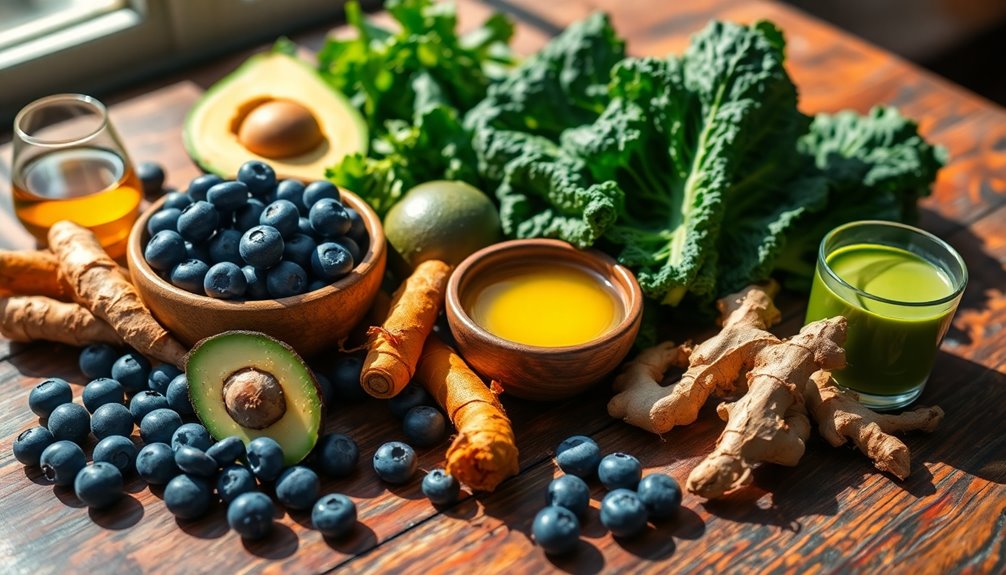An anti-inflammatory diet focuses on whole, nutrient-rich foods that can help reduce chronic inflammation and improve your overall health. You'll want to include fresh fruits, vegetables, whole grains, healthy fats like olive oil and avocados, and spices such as turmeric and ginger. Avoid refined carbs, added sugars, and processed foods, as they can increase inflammation. Regular physical activity, stress management techniques, and quality sleep also play essential roles in lowering inflammation. By adopting this diet and lifestyle, you can enhance your energy levels and promote better health. Explore more to discover exciting recipes and meal planning tips!
Key Takeaways
- An anti-inflammatory diet emphasizes whole, nutrient-dense foods like fruits, vegetables, whole grains, and healthy fats to combat chronic inflammation.
- Including antioxidants from fresh produce and healthy fats from sources like olive oil can lower inflammation markers in the body.
- Regular physical activity, stress management, and quality sleep are essential lifestyle factors that contribute to reducing inflammation levels.
- Avoiding refined carbohydrates, added sugars, and processed foods is critical for maintaining an anti-inflammatory diet and overall health.
- Meal planning and community support enhance adherence to an anti-inflammatory diet while fostering motivation and healthy relationships.
Understanding Inflammation
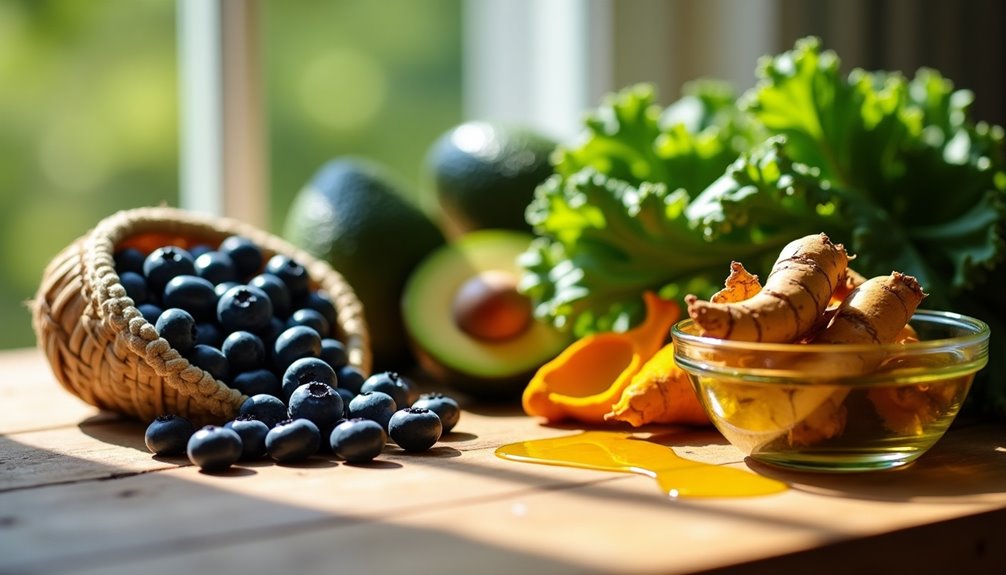
While inflammation is a natural response of your immune system to injury or infection, it can become problematic when it lingers or occurs inappropriately. When this happens, you might experience chronic inflammation, which is linked to various chronic diseases like heart disease, diabetes, and arthritis. Understanding inflammation is vital for your overall health.
Your body releases inflammation markers, such as cytokines and C-reactive protein, to signal that something's wrong. If these markers remain elevated over time, they can lead to long-term health issues. For instance, chronic inflammation can damage your blood vessels, increase insulin resistance, and promote the development of autoimmune diseases. Recognizing these signs early can help you take proactive steps.
You might be wondering how to manage inflammation in your everyday life. First, focus on your diet. Foods rich in antioxidants, omega-3 fatty acids, and fiber can help lower inflammation markers. Think about incorporating more fruits, vegetables, whole grains, and healthy fats into your meals. Additionally, adopting a custom keto diet plan can provide tailored meal options that promote anti-inflammatory benefits.
Also, engaging in regular physical activity, managing stress, and getting adequate sleep can markedly reduce inflammation levels as well.
Key Principles of the Diet

The key principles of an anti-inflammatory diet focus on incorporating whole, nutrient-dense foods that can help reduce inflammation and promote overall health. By emphasizing unprocessed foods, you can foster a sense of community through shared meals that nourish your body and soul.
One effective method is to make recipe swaps: for instance, you might replace white rice with quinoa or choose olive oil instead of butter. These small changes can lead to significant health benefits over time, enhancing your meals while keeping inflammation in check.
Incorporating an array of colorful fruits and vegetables is crucial, as they're rich in antioxidants and phytonutrients. Think about adding berries to your breakfast or tossing spinach into your salads. Each bite can contribute to a healthier you, while also creating a vibrant dining experience that you can share with friends and family.
Don't forget about healthy fats! Including sources like avocados, nuts, and fatty fish can further support your anti-inflammatory goals. They not only enhance flavor but also provide essential nutrients that your body craves. Additionally, embracing a plant-based diet can significantly enhance your intake of these anti-inflammatory foods, providing even more health benefits.
Foods to Include
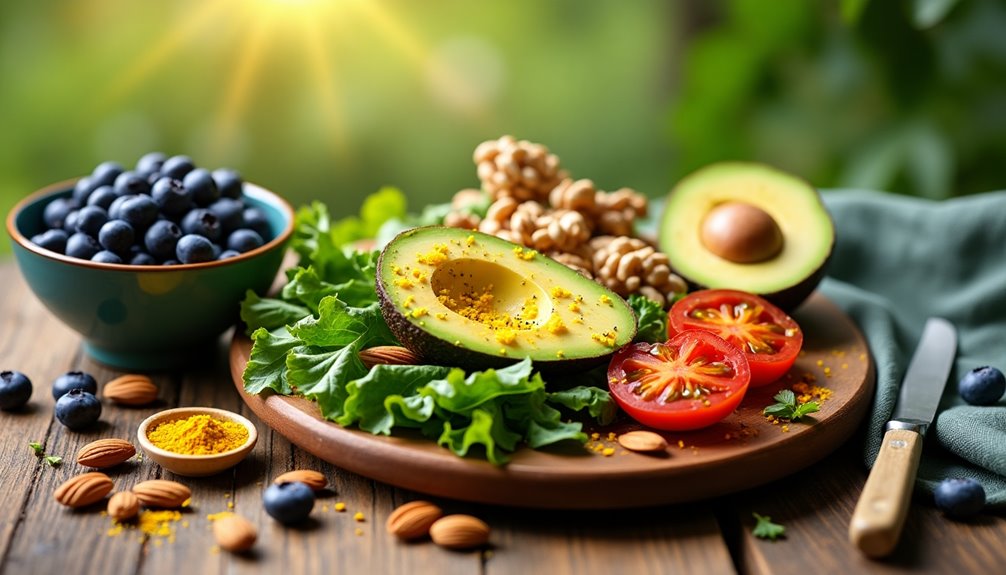
When planning your meals, focus on incorporating a variety of foods known for their anti-inflammatory properties. Start with fresh fruits and vegetables, particularly leafy greens like spinach and kale, which are packed with antioxidants. Berries, such as blueberries and strawberries, are also fantastic choices, as they contain powerful compounds that combat inflammation.
Next, consider whole grains like quinoa, brown rice, and oats. These foods provide fiber, which is essential for maintaining a healthy gut, and a well-functioning gut can notably reduce inflammation.
Don't forget about healthy fats; olive oil, avocados, and nuts are great options that not only enhance flavor but also contribute to heart health.
You can enhance your meals by experimenting with cooking techniques. Try roasting or steaming vegetables to preserve their nutrients while adding depth to their flavors. Grilling or baking proteins like salmon and chicken can also introduce delicious flavor combinations without resorting to unhealthy fats.
Herbs and spices like turmeric, ginger, and garlic are excellent for boosting both taste and health benefits. Incorporating these into your dishes can transform ordinary meals into flavorful experiences that nourish your body. Additionally, adopting a holistic approach to eating, similar to the comprehensive approach used in Crunchless Core, can significantly amplify the benefits of your anti-inflammatory diet.
Foods to Avoid

Certain foods can trigger inflammation and should be limited or avoided in an anti-inflammatory diet. By recognizing these inflammatory triggers, you can make choices that support your overall health and well-being.
One of the most common culprits is refined carbohydrates, such as white bread, pastries, and sugary cereals. These foods can spike your blood sugar levels, leading to an inflammatory response in your body. Additionally, it's wise to steer clear of added sugars found in sodas, candies, and many processed foods. Excess sugar can promote inflammation and contribute to weight gain, which further exacerbates the issue.
Trans fats, often present in fried foods, margarine, and packaged snacks, are another major inflammatory trigger. They not only raise bad cholesterol levels but also activate inflammatory pathways in your body. Instead, consider healthier fats, like those found in avocados, nuts, and olive oil.
Another group to watch out for includes processed meats like bacon, sausage, and deli meats. These often contain preservatives and additives that can trigger inflammation. Instead, look for lean protein sources such as fish, poultry, and legumes.
Lastly, limit your intake of excessive alcohol, as it can lead to gut inflammation and disrupt your body's balance. Embracing a balanced diet can help you avoid the complications of weight loss challenges that often arise from poor dietary choices.
Meal Planning Tips

Planning meals with an anti-inflammatory focus can make a significant difference in your health and well-being. To get started, consider developing a weekly meal plan that incorporates a variety of anti-inflammatory foods like leafy greens, berries, nuts, and fatty fish. This approach not only helps you maintain a balanced diet but also simplifies your grocery shopping.
Create a list based on your meal plan to guarantee you only buy what you need, reducing food waste and saving money.
While grocery shopping, look for fresh, organic produce and high-quality proteins. Reading labels can help you avoid hidden sugars and unhealthy fats. Don't hesitate to ask for assistance in the store; many communities have resources available to guide you toward healthier choices.
Once you've stocked your kitchen, focus on cooking techniques that preserve the nutrients in your food. Steaming vegetables, grilling fish, and using healthy fats like olive oil can enhance flavors while keeping dishes nutritious. Batch cooking can also be a game-changer; prepare larger portions of your favorite meals and store them in the fridge or freezer for quick access throughout the week.
Lastly, consider joining a cooking group or online community focused on anti-inflammatory eating. Sharing experiences and recipes with others can foster a sense of belonging and motivate you to stick with your meal planning efforts. By implementing these meal planning tips, you'll find it easier to embrace an anti-inflammatory lifestyle. Additionally, following a structured diet program like the 3X Diet System can further enhance your metabolism and promote weight loss.
Benefits of an Anti-Inflammatory Diet
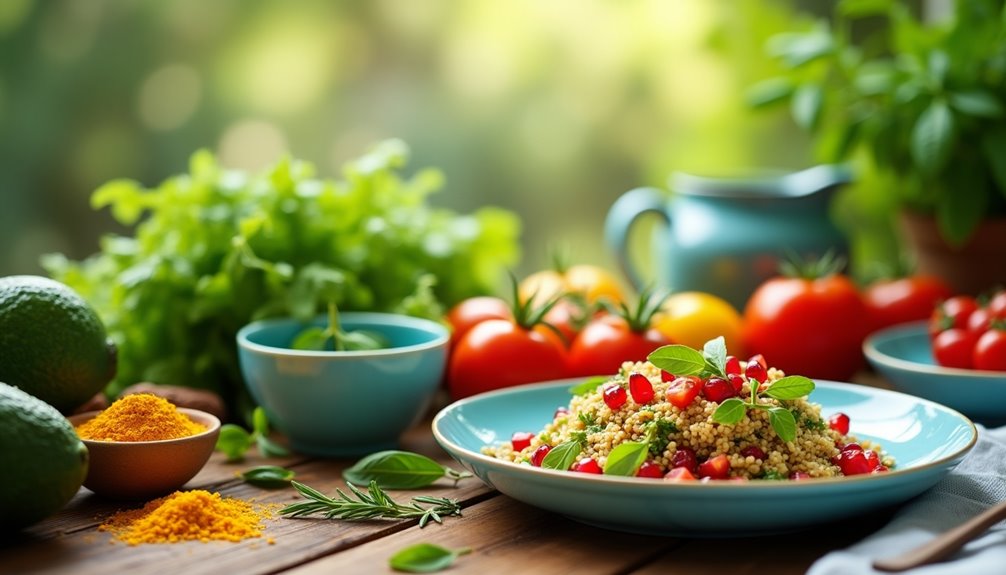
An anti-inflammatory diet offers a range of health benefits that can enhance your overall well-being. By focusing on whole, nutrient-dense foods, you can reduce chronic inflammation, which is linked to various health issues, including heart disease, diabetes, and autoimmune disorders. Incorporating foods rich in antioxidants, such as berries, leafy greens, and nuts, not only boosts your immune system but also promotes a healthy gut microbiome.
One significant benefit of adopting this diet is its potential to improve your energy levels and mood. Many people report feeling more energized and less fatigued once they eliminate processed foods and added sugars from their meals. This change can also lead to better mental clarity and focus, allowing you to engage more fully in your daily activities and relationships. Additionally, following an anti-inflammatory diet can be complemented by the benefits of a Keto diet, which also emphasizes whole foods and can help reduce inflammation.
Moreover, the long-term effects of an anti-inflammatory diet can be profound. Research indicates that individuals committed to this way of eating may experience a reduced risk of chronic illnesses over time. By prioritizing healthy fats from sources like olive oil and fish, along with fiber-rich whole grains, you're not only nourishing your body but also setting the stage for a healthier future.
Ultimately, adopting an anti-inflammatory diet can foster a strong sense of community and belonging, as you share meals and recipes with like-minded friends and family. Embracing this lifestyle together can amplify the positive changes, making it easier for you to stay motivated and enjoy the journey toward better health.
Recipes to Try
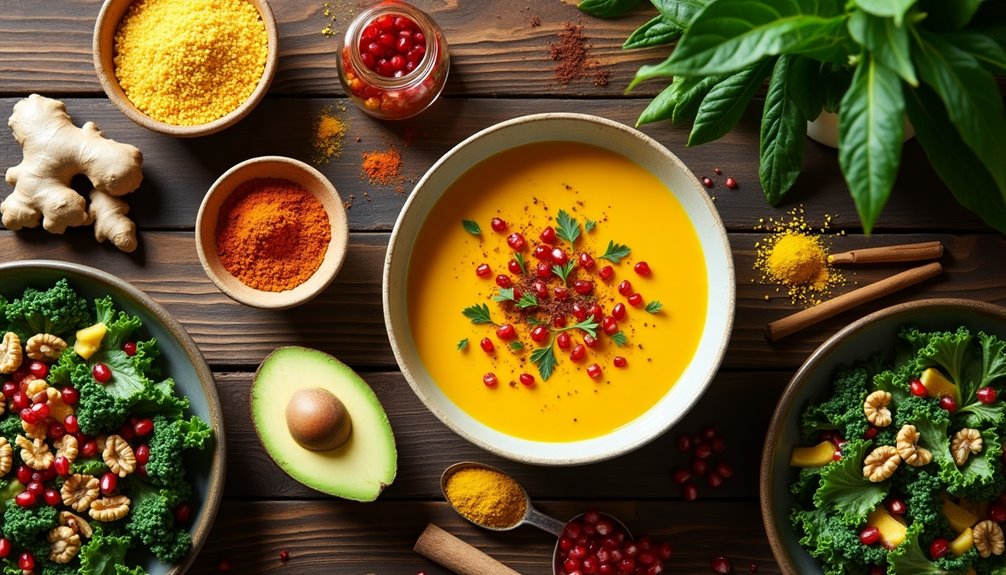
When it comes to embracing an anti-inflammatory diet, trying out new recipes can be a fun and rewarding way to stay committed to your health goals. You don't have to be a gourmet chef to whip up delicious meals that support your body's needs. Start with simple cooking techniques like roasting, steaming, or sautéing to preserve the nutrients in your ingredients.
Consider a colorful quinoa salad loaded with fresh vegetables, such as cucumbers, bell peppers, and cherry tomatoes. Toss in a handful of spinach, a sprinkle of feta cheese, and a simple dressing of olive oil and lemon juice. This dish not only bursts with flavor combinations but also provides essential antioxidants and healthy fats.
Another great option is a turmeric-infused vegetable stir-fry. Use a mix of your favorite seasonal veggies, toss in some ginger and garlic for added zing, and finish with a splash of low-sodium soy sauce. The bright yellow turmeric not only enhances the dish's appearance but also offers powerful anti-inflammatory benefits.
For breakfast, try overnight oats made with almond milk, chia seeds, and topped with fresh berries and a drizzle of honey. This meal isn't only satisfying but also sets a positive tone for your day.
These recipes help you explore various cooking techniques while enjoying vibrant flavor combinations. They'll keep you excited about your anti-inflammatory journey, making it easier to stay on track with your health goals. Additionally, incorporating low-carb, anti-inflammatory foods into your meals can further enhance your overall wellness.
Lifestyle Changes for Success
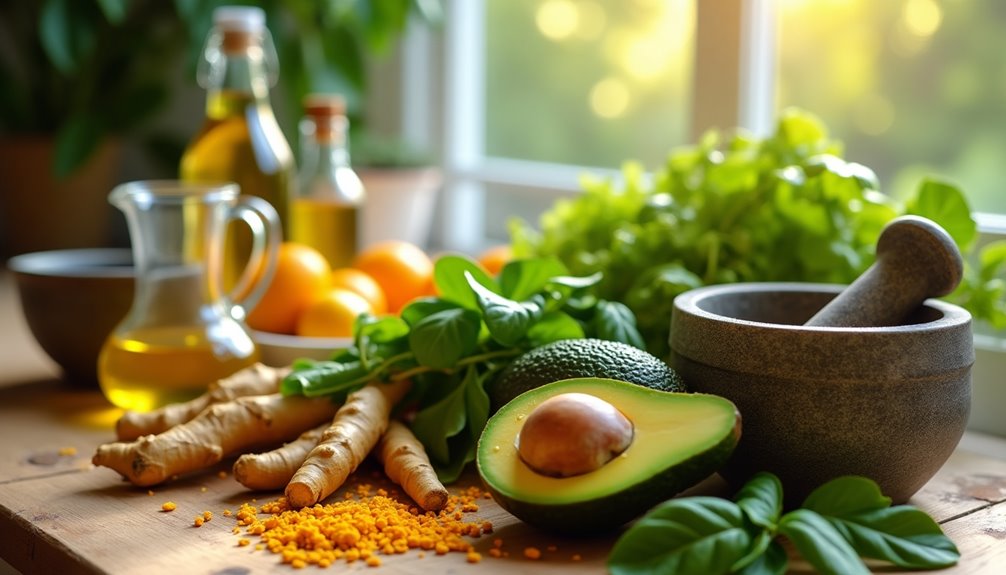
To truly succeed in maintaining an anti-inflammatory diet, it's crucial to make some lifestyle changes that support your new eating habits. Start by incorporating regular exercise routines into your life. Aim for at least 150 minutes of moderate aerobic activity each week, like brisk walking or cycling. Not only does exercise help manage weight, but it also reduces inflammation and boosts your mood. Find activities you enjoy, whether it's dancing, hiking, or joining a local sports team—this way, you'll look forward to staying active.
Equally important is stress management. Chronic stress can trigger inflammation, so it's vital to find effective ways to unwind. Techniques such as mindfulness meditation, yoga, or deep-breathing exercises can make a significant difference. Carving out time for yourself, even if it's just a few minutes a day, can help you recharge and refocus. Additionally, engaging in breath awareness practices can further enhance your ability to manage stress effectively.
Consider connecting with like-minded individuals who are also dedicated to an anti-inflammatory lifestyle. Joining a support group, a cooking class, or online forums can enhance your journey by providing encouragement and sharing tips.
Lastly, make sure you're getting enough sleep, as quality rest is crucial for reducing inflammation and supporting overall health. Aim for 7-9 hours of sleep each night to allow your body to recover and rejuvenate. By prioritizing these lifestyle changes, you'll not only reinforce your commitment to an anti-inflammatory diet but also foster a healthier, happier you.
Frequently Asked Questions
Can I Drink Alcohol on an Anti-Inflammatory Diet?
When it comes to alcohol consumption, moderation is key. While enjoying a drink at social events can be part of your lifestyle, keep in mind that excessive alcohol can increase inflammation in the body.
Diet modifications may help you strike a balance; consider choosing lower-sugar options or limiting quantity. Ultimately, it's about finding what works for you while still enjoying connections with others without compromising your health goals.
Is the Anti-Inflammatory Diet Suitable for Children?
When considering a diet for children, you should prioritize their growth concerns and nutrient balance. A well-planned diet that includes a variety of foods can support healthy development. Focus on whole grains, fruits, vegetables, and lean proteins to guarantee they get essential nutrients.
It's important to consult a pediatrician or nutritionist to tailor the diet to your child's needs, guaranteeing they thrive while enjoying the benefits of healthy eating habits.
How Quickly Can I Expect to See Results?
Imagine planting a seed in fertile soil; with the right care, it'll sprout quickly. Similarly, when you commit to meal prep and stick to an exercise routine, you might notice changes in your energy levels and mood within just a few weeks.
Consistency is key, and while some results can appear sooner, lasting transformation often takes a bit longer. Stay patient, and remember, you're not alone on this journey!
Are There Any Supplements Recommended for Inflammation?
If you're looking to address inflammation, consider incorporating Omega 3 supplements into your routine. They're known for their potential to reduce inflammatory markers.
Turmeric capsules are another great option; they contain curcumin, which has strong anti-inflammatory properties. Both supplements can complement a healthy lifestyle and help you feel your best.
Always check with a healthcare provider before starting any new supplement to make sure it's right for you.
Can I Follow This Diet if I Have Food Allergies?
Absolutely, you can navigate your dietary choices like a skilled captain steering a ship through rocky waters. Just keep cross-reactivity concerns in mind—some allergens might overlap. However, there are plenty of substitution options available.
For instance, if you're allergic to nuts, seeds or legumes can step in as excellent protein sources.
Always consult a healthcare professional to confirm your choices align with your health needs, allowing you to thrive in your culinary journey.
Conclusion
Adopting an anti-inflammatory diet might seem challenging, but it doesn't have to be restrictive or bland. By focusing on whole, nutrient-rich foods, you can enjoy a variety of delicious meals that nourish your body and reduce inflammation. Remember, it's not about perfection but progress; even small changes can lead to significant benefits. Embrace this journey, experiment with new recipes, and you'll likely discover a newfound love for food that supports your health.

